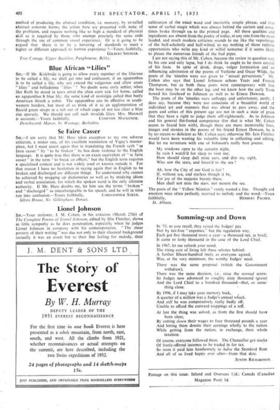Lionel Johnson
SIR,—Your reviewer, J. M. Cohen, in his criticism (March 27th) of The Complete Poems of Lionel Johnson, edited by Idin Fletcher, shows as little sympathy as he does penetration, especially when he judges Lionel Johnson in company with his contemporaries. " The sheer poverty of their writing " was due not only to their classical background (actually it was an asset) but to their fine feeling for melody, their cultivation of the exact word and inevitable simple phrase, and that sense of verbal magic which was always behind the curtain and some- times broke through -on to the printed page. All these qualities and ingredients are absent from the poetry of today, at any rate from the more lauded, and much modern criticism sounds to me like the vaporisings of the half-scholarly and half-witted, to say nothing of those ruthless opportunists who write any kind of wilful nonsense if it seems likely to please the numerous friends of the bad piper.
I am not saying this of Mr. Cohen, because the review in question may be his one and only lapse, but I do think he ought to be more careful of his facts. In spite of drink, drugs, vulgar fornication and an influencing admiration of the poems of Verlaine and Oscar Wilde, the poets of the 'nineties were not given to " sexual perversions." Mr. Cohen also says that Lionel Johnson echoes Yeats and Francis Thompson, but as both these poets were contemporary with him the boot may be on the other leg, and we know how the early Yeats bowed his forehead to Johnson as well as to Ernest Dowson.
The poets of the 'nineties were unhappy and unfortunate, partly, I dare say, because they were too conscious of a beautiful world of individual art and manners that was about to pass away, and the poets and critics of this present age are not in such a state of grace that they have a right to judge them sell-righteously. As to Johnson and his general flat-footed competence (for that is what Mr. Cohen seems to brand him with), though there are more memorable lines, images and stanzas in the poems of his friend Ernest Dowson, he is by no means so deficient as Mr. Cohen says; otherwise Mr. lain Fletcher Would have been wasting his valuable time in collecting and editing. But let me terminate with one of Johnson's really best poems: My windows open to the autumn night, In vain I watch'd for sleep to visit me; How should sleep dull mine ears, and dim my sight, Who saw the stars, and listen'd to the sea ?
Ah, how the City of our God is fair !
If, without sea, and starless though it be, For joy of the majestic beauty there, Men shall not miss the stars, nor mourn the sea.
The poets of the " Yellow Nineties" rarely wasted a line. Thought and emotion were often perfectly married to melody and the word.—Youru


































 Previous page
Previous page